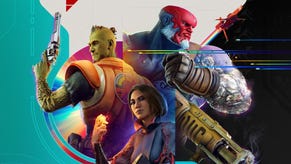Concord review - a hero shooter that nails the shooting, but fumbles the heroes
Overcooked.
I've always thought there was something presumptuous about hero shooters. Building an entire game around a bunch of characters I'm expected to like purely on vibes is a big ask. Even BioWare, with its decades-long legacy of character-driven storytelling, recently got dinged for assuming players would immediately buy into Dragon Age: The Veilguard's new party in the game's misguided initial trailer.
Sure, Blizzard got away with it back in 2016. But putting aside the fact Blizzard gets away with a lot of things it probably shouldn't, the developer had two big advantages with Overwatch. First, the hero shooter was a new and shiny concept following a decade of playing with toy guns as faceless military men (with the exception of Team Fortress 2, although that's a slightly different kettle of fish). Second, Overwatch was a masterclass in mascot manufacture.
Sadly, neither of these things are the case with Concord. Firewalk Studios' hero shooter arrives several years after the bandwagon departed, boasting a roster of characters that, while not entirely without their charms, certainly wouldn't be Nick Fury's first choice when assembling the Avengers. Which is a shame, because there's a decent multiplayer shooter here, one that's lithe and snappy and highly rewarding of teamwork. But that doesn't change the fact that it misses its own brief, leaving it struggling to stand out elsewhere.
Concord is a collection of largely familiar 5v5 multiplayer shooter modes, wrapped in a colourful retro sci-fi universe that, at the time of writing, mostly exists in a big black lore hole. Your heroes are collectively known as 'freegunners', a loose consortium of mercenary teams that flit around the galaxy doing jobs that form vague premises for your multiplayer shenanigans. A straightforward Team Deathmatch, for example, is framed as a rival team issuing a challenge to yours, with the match introduced via a lavish cutscene of a spacecraft dropping your team off.
In its broad strokes, Concord is a thoroughly adequate multiplayer shooter. Its combat is poised between the highly accessible gunplay of Overwatch, and something snappier and more demanding like Valorant. Movement speed and agility varies between characters, but most of them are fairly swift on their feet, equipped with some amount of aerial acrobatics and capable of performing nippy dodges for which the camera briefly zooms out to third person. Likewise, while weapons differ in how easy and immediately satisfying they are to wield, I don't think there's a firearm I'd say was an outright dud.
What's supposed to set Concord apart, of course, is its colourful roster of characters to play as. But from the moment the character select screen opens on your first match, something feels off. It's hard to put a finger on precisely what's wrong, but generally, the heroes seem to be visually either under or overdesigned. They range from faintly more colourful versions of soldiers and snipers, to a man that looks like a cactus in the early stages of norovirus. A few of the design decisions are outright baffling, such as the stupidly tiny sunglasses worn by the assassin character Bazz.
Frankly though, I think the problem with Concord's characters can be more acutely diagnosed through their names. Overwatch is a useful reference point here. Overwatch's heroes are called things like Tracer, Mercy, Bastion, Widowmaker, bold, declarative names that give a sense of who that hero is, and feel good to say. Even Overwatch's less determinist names are carefully selected. Winston, for example, is a terrible name for a hero. Unless that hero happens to be a 300lb gorilla, in which case it's perfect.
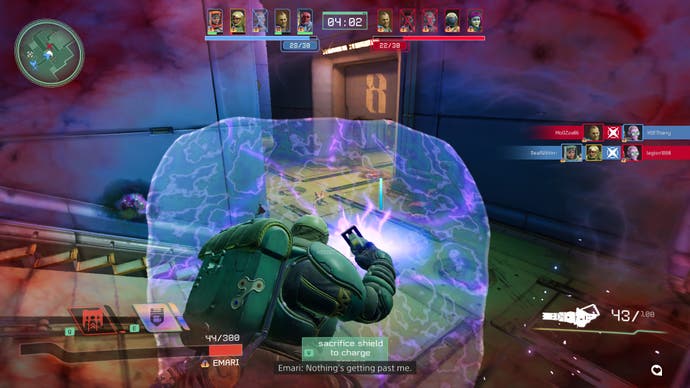
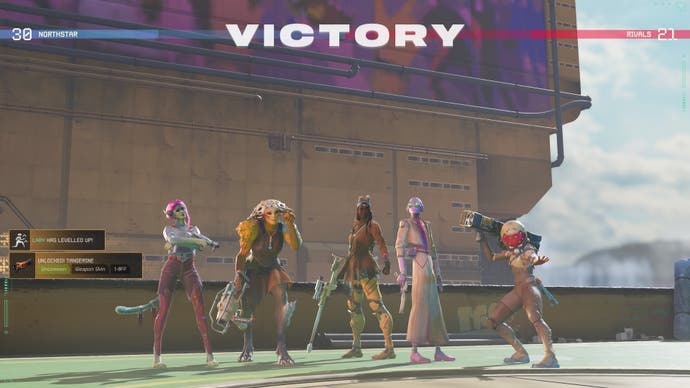

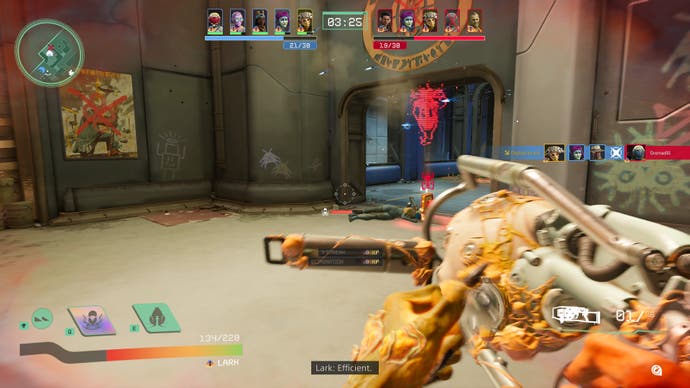
Now compare these to Concord's names. Teo, Roka, Haymar, Jabali, Daveers. The only thing these tell you is that you've gone too far down the list of baby names that you and your future coparent just googled (Jabali is quite a nice name, in fairness. But when it comes to heroes, it's not exactly Spider-Man). A good test for whether a name is fit for a playable hero is to say out loud "Oh boy, I can't wait to play as [INSERT NAME HERE]". I did this for all of Concord's heroes, and one that made me wince the most was for old cactus boy, whose name is Lennox. I cannot imagine ever saying "Oh boy, I can't wait to play as Lennox" unless I'm playing a PS1-era boxing simulator.
Not all the names are quite so terrible. There are a couple of half-decent ones like "Duchess" and "Star Child", as well as "1-0FF" the giant yellow pedal bin you've probably seen in trailers. But most of them are just vague and distinctly unheroic. Nominative determinism might be poor writing practice in a literary novel or an RPG. But it has its place when it's pretty much all you know about the character apart from how they look. One of Concord's heroes is simply called 'Daw'. That's not a name, Firewalk! That's a noise.
Between their limp names and weird looks, Concord's heroes just come off as a bit lame. This is deeply unfortunate, because some of them are pretty darned fun to play. Roka, for example, quickly became my first choice. This is partly because I'm a sucker for a rocket launcher, but Roka is also one of the most thematically consistent characters in the game, both visually and mechanically. Her two active abilities let her hover in the air using a rocket-powered jetpack, and essentially turn herself into a rocket by driving into the ground with a powerful (but tricky to pull off) punch. Pummelling enemy teams with rockets from above is immensely satisfying, especially since floating in the air like this makes you extremely vulnerable to attack.
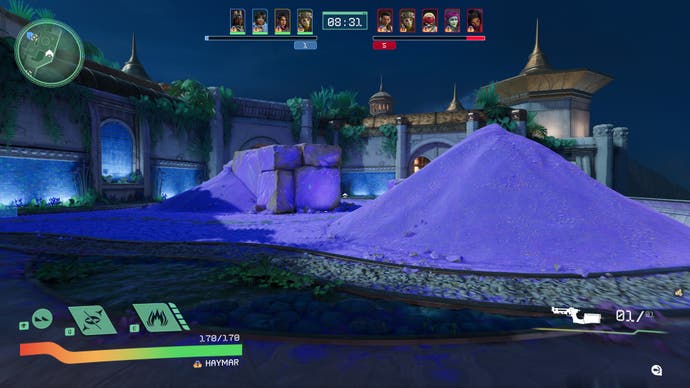


Roka is my favourite Concord character, but she's isn't the only hero who feels distinctive and interesting to play as. Daveers runs around firing toxic sludge out of a grenade launcher, which she can then ignite using a fire attack, so the play is to gunge out as much of the battlefield as possible and then try to catch people in the flames. Bazz, the woman with the terrible glasses, is a knife-wielding assassin who can track enemy players through walls. IT-Z has a delightfully devious ability to create a clone of herself while teleporting to another location. One of the most interesting characters is Lark. Wielding a weapon that splits the difference between a shotgun and Halo's needler, Lark can cover the map in weird plants that boost movement and armour for your team, while slowing and weakening enemies.
From a mechanical perspective at least, these characters feel like they've been thought about a lot. And the fact you can only bring five into a match allows for plenty of tactical variety. A team that crowds around the minigun-wielding tank that is Emari plays very differently to one comprised entirely of smaller, nimbler characters. There's also a lot of scope for shaking up a fight by changing characters mid-match. It even encourages this, with you received higher-quality buffs for each character you switch between during a round, making you ask whether it's worth playing as your favourite character now, or wait until later in a match when you can really get the most out of them.
Yet not every hero is quite so well thought out. Jabali wields a WW1-style machinegun and throws magical orbs, which just feels like video game pick 'n' mix. Lennox has a similar problem, he wields two pistols (though not at the same time), can self-heal and…throw an exploding knife? None of it really fits. My least favourite character is Teo, a bog-standard soldier who wields an assault rifle and throws grenades. He feels like the product of a memo from corporate that read "Must add Call of Duty character." I really hate it when games like this pander to the CoD crowd. Take their blasted M4A1 away and make them bloody learn.
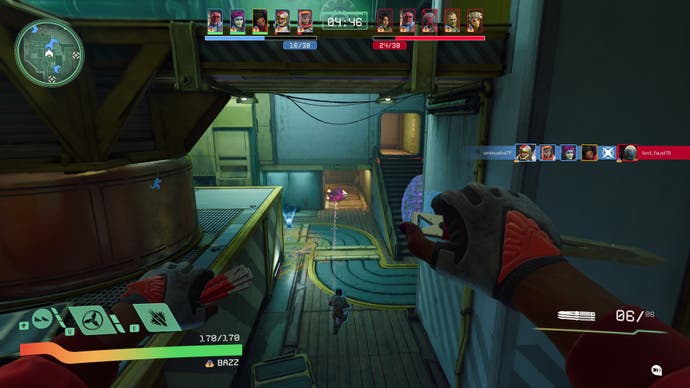
Of the 16 available heroes, 10-12 of them are mechanically interesting to play as. Roughly half of those are appealing characters. I don't think any of them would make it into an Overwatch roster as they stand (maybe Roka and Haymar if they had better names). It may seem unfair to fixate on these more aesthetic issues. But they're impossible to ignore because they're a fundamental part of Concord's USP. Or at least, the closest it gets to having one.
Without a banger selection of heroes out of the gate, there's little else to set Concord apart. The available game modes are all perfectly entertaining, but none of them are especially original. The standouts are probably Trophy Hunt, a variant of team-deathmatch where you must collect the fallen freegunners' card for a kill to score you a point, and Signal Chase, a king-of-the-hill style mode where you fight a series of moving control points. The key gimmick here is that the game tells you where the next control point will spawn while the current one is active, forcing you to choose whether to wrestle control of a point that may only have a few seconds left, or sacrifice a few points to try to the beat the other team to the next area.
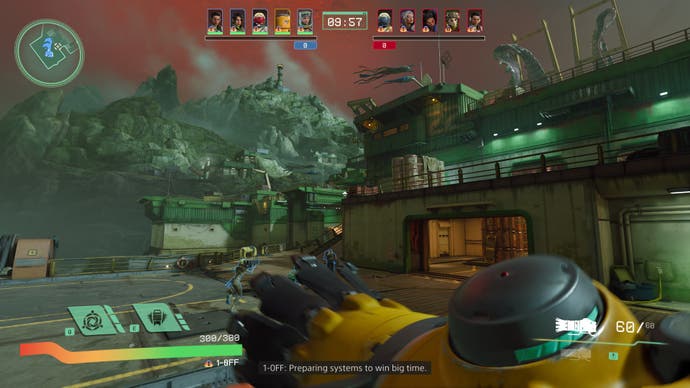
The maps, too, are functionally fine, but thematically sterile considering how colourful the game is. Robot Ruins is probably the most interesting, with the map scattered with the wreckage of giant automata. Salt Palace has pleasant vibes too, although I’m not sure salt is the most exciting theme to build a map around, even if it is purple. At the other end of the scale, however, is a blocky sci-fi shanty town filled with shipping crates. Out of everything I saw in Concord, this is the design decision that annoyed me the most. You have the infinite canvas of the universe to paint on, and you build a map around shipping crates?
It's things like this that make me feel a bit sick when I hear that Concord took eight years to make, because whatever its qualities (and there is some quality here) there's no way on Earth or any other planet that it was worth that. I suspect, therefore, we are yet to see Concord at its best. The game’s ongoing story will apparently be delivered through weekly cutscenes, which may lend some spark to the characters that their initial impression lacks. There is also potential in the wider universe Firewalk has established. There is a wit and charm in its Galactic Guide, which provides an overview of Concord’s retrofuturist cosmos, that I wish was more evident during play. There are also hints at the fringes of its animated map of interesting events to come.
The question now, given Concord’s allegedly poor uptake among players, is whether we’ll get to see that. I for one hope we do. Concord may be a flawed game, but it is far from a hopeless one. And while the game currently misses the brief on the ‘hero’ part of its genre, it is worth remembering that heroes are ultimately defined by their actions, rather than their costumes.
A copy of Concord was provided for review by Sony.









